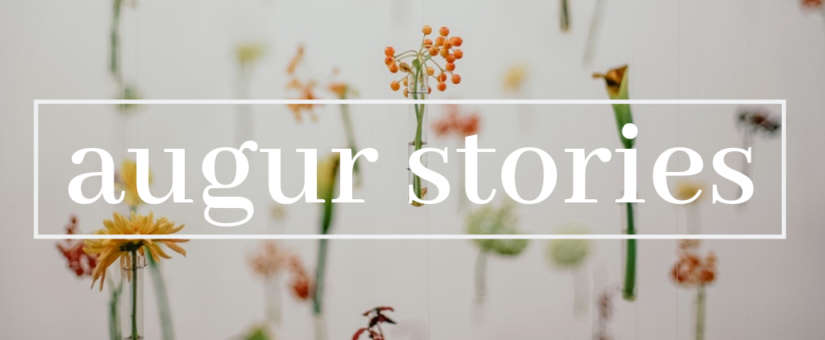
Dishling
- Posted by Augur Blog
- On January 30, 2019
- 0 Comments
- short stories
By Bill Teitelbaum
What I knew of Margaret Taft, gathered over the years from the few people on the faculty who could recall her for me, was that by nature she was no more ruthless than anyone else in the graduate program, and despite Paul Fisher’s best efforts to recruit her, the idea of being an egg-donor was right up there for the lady with pole-dancing and humping wet-wash at the fluff-and-fold. But her advisor, Professor Froelling, had just kicked back her second thesis proposal, in the circumstances her retention as a T-A looked iffy, both the bursar’s office and the bookstore would have appreciated a word with Ms. Taft whenever she could stop by, and off-campus summers could be mighty long in Atlanta when you didn’t have a Tara to go home to. So there she was.
“From what I understand it’s not that uncomfortable,” Fisher offered. “They harvest—”
“They harvest?”she shrieked. “Is that what they call it?”
“You’re just being squeamish.”
“I’m being harvested. It’s not like they send me into the toilet with a paper cup and a magazine. I could do that three or four times a day.”
You can see where I get my sense of theater, while Fisher’s contribution seems to have been that scientific detachment that equips me to talk about myself without putting a bullet in my brain. The Froellings do what they can, but Mother’s Day can be strange. Mrs. Froelling begins to cry at half-past ten in the morning as a rule, and Professor Froelling encourages me to work on my lifestyle.
“Consider your advantages, dear boy. A world-class faculty. Nobel laureate material. Other people merely have parents.”
And he’s right, as far as that goes. I certainly haven’t lacked for attention. But looping about in our polymeric soups, what else are we about than closure and extension? Even for dishlings attachment is basic.
“Dear Margaret,” I write. “Dear Ms. Taft, you may not remember me.”
Then I take myself to a festive brunch at the Peachtree Radisson, the Sky Room with its revolving vistas, College Park to Stone Mountain and the Emory campus rolling in on the quarter with its Spanish tile roofs and columned arcades.
Atlanta can break your heart in the spring. Forsythia hedges in yellow ranks, azaleas framing dogwood groves, crape myrtles in bloom like magenta clouds. Anything can be beautiful from a distance of course, but elevation has a tendency to ennoble one’s perceptions, sentiment gains the dignity of perspective, so that time, too, seems to unwind as we turn here in space, and it occurs to me that perhaps life unfurls as a series of experiments for each of us if we’re lucky. To risk, to find out? No one asks to be born after all. Don’t all of us get more or less plopped into being? It seems appropriate to me suddenly that Mother’s Day brunch should be a buffet.
“Here’s to you, Margaret Taft,” I say, and as I gaze down upon my turning world, I can’t help thinking of Paul Fisher as well, and whether any quasi-semi-siblings of mine are running around down there. Dancing their randomized helical hulas? In hopes of linkage through happy collision?
Or am I merely caught up in the sentimentality of the occasion, a chemoid dishling with delusions of community?
Naturally I acknowledge the proposition’s absurdity. Professor Froelling is right. It’s like presuming some wistful connection to DuPont or Monsanto. Genetics notwithstanding I could be the result of anything—a temperature change, a pressure wave. That’s what makes me so fascinating, he reminds me. Social constructs are meaningless at the molecular level.
Still, it’s not easy straddling this line in the ether between biochemistry and who-can-say. You wonder in this state what gives one distinction—that delusion of selfness, derived by association, or does some original mystery obtain, something they don’t provide funding to characterize? Am I one with all life, I ask, an elaborated mucusoidal accident of polarities, or is there something intrinsic to this snotule of irreducible significance?
It’s as if I were human that I ask these questions. Where did I come from, I wonder, as if I don’t know. What am I for, as if I don’t know that either. Am I a creature of memory and wish, of destiny, or will, or was I just sort of fabricated from ingredients to see what would happen, to find out if one day I would worry about acting my age, say, or pulling my weight, or getting somewhere, or amounting to something?
Anything can happen when I venture these moods, and rather than risk myself to public compassion, I hurry home to the lab where I can ruminate like a cow beneath suspicion. But there, almost as I imagined it, a pink while-you-were-out slip is wedged in my pigeonhole, a call-me-please from someone calling herself Margaret Fisher.
“Margaret Fisher? Well, at least she’s been getting my cards,” I thought. But I certainly didn’t care for the message of that message. The implications were alarming.
Lab-rats in love? But this was horrible to me! I think I liked them better as arbitrary gene pools.
For clearly we were well beyond biochemistry here. Apparently Paul and Margaret had conceived an experiment of their own, those spontaneous rascals. Decisions had been made, more or less. Sapient deliberation had entered the picture.
The question, however, timing being all, was—when? What they were to me, what I was to myself, all seemed to hinge on what they were to each other at that moment of fusion. Was I randomness itself, consigned to glass like a note in a bottle? Or did I burst from a kiss when it dawned on them that even graduate students were capable of life?
But wouldn’t this mean I had civil identity in any event? The complications were staggering. And then what of my standing in the scientific community? Suppose I turned out other than a confluence of zygotes? As a person would I still be a subject worthy of study?
I couldn’t breathe. Prospects of bozo normality shimmered behind my hammered eyes. Drafting resumes? Applying for how-to-interview workshops? Would I be all I could be now in the service of my country? Would I know the thrill, be still my heart, of filing a ten-forty?
Confused as I might have been ten minutes before, the past seemed an Eden of simplicity when compared to the possibilities cascading before me.
Would she expect a gift, I asked myself. Flowers? Probably she would like that, I thought bitterly. That dismal, maternal hunger to be appreciated. Refrigerator art. Pasta creatures. Was there no end to these passive extortions?
And how come I didn’t call, she would ask. Didn’t I get her message? She didn’t ask that much. What was so hard about picking up a phone
This story was previously published as “Mother’s Day” in The First Line Literary Journal, 2003.
BILL TEITELBAUM’s work has appeared in journals such as Bayou, Confrontation, Iconoclast, The MacGuffin and Rhino, and in anthologies such as Western Michigan University’s Art of the One-Act. Currently, Bill is shopping a collection of stories about the abruptly single called Are You Seeing Anyone? For more about Bill, see his recent interview by The Forge.
Liked this post? Check out zamana by Amrita Chakraborty.




0 Comments